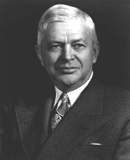Charles Erwin Wilson
Charles Erwin Wilson (born July 18, 1890 in Minerva , Ohio , † September 26, 1961 in Norwood , Louisiana ) was an American manager and politician .
Life
Wilson's parents were Thomas E. Wilson and Rosalind Unkefer Wilson. His father was a school principal in Minerva, his mother a teacher. When Charles Wilson was four years old, the family moved to Mineral City, Ohio, where he attended public school. In 1904 the family moved to Pittsburgh ( Pennsylvania ). There he graduated from Bellevue High School and then studied electrical engineering at the Carnegie Institute of Technology in 1909, he graduated as an electrical engineer. Shortly thereafter, he began an internship at Westinghouse Electric & Manufacturing Company , where he remained employed for the next 10 years. Here he came into contact with the automotive industry and gained experience with mass production. His greatest achievement at Westinghouse was his development of an electric starter in 1912. Four years later he headed the automotive electronics development department. During the First World War he was responsible for Westinghouse radio generators and electric motors .
In April 1919 he was appointed chief engineer at the Remy Electric Company in Anderson, Indiana , a subsidiary of General Motors . The products he developed contributed significantly to Remy Electric staying financially healthy. In December 1921 he became works manager and in December 1924 Assistant General Manager , which was followed by appointment as General Manager in February 1925.
In 1926 the Dayton Engineering Laboratories Company , which had become part of GM in 1920, was merged with the Remy Electric Company . Wilson became President and General Manager of the new Delco-Remy Corporation, which then had 12,000 employees. He was responsible for the development of Delco- batteries , the Lovejoy - shock absorber and industrial motors for cooling and washing machines as well as for car lighting.
Charles Wilson became assistant to the President of General Motors, Alfred P. Sloan , in January 1929 , and one of the group's vice presidents in May of the same year. In this position he was responsible for the acquisitions of Winton Engine Company , Electro-Motive Company (both in Cleveland, Ohio ), Northeast Electric Company in Rochester, New York , Allison Engineering Company in Indianapolis , Sunlight Electrical Company , Packard Electric Company of Warren, and McKinnon Industries, Ltd. in St. Catharines , Ontario ( Canada ). He was also involved in the acquisition of a minority stake in Bendix Aviation Corporation and parts of North American Aviation . On May 1, 1939 he became Executive Vice President and was the successor of Sloan from June 3, 1946 to January 26, 1953 CEO of General Motors.
From 1953 to 1957 he was the fifth Secretary of Defense of the United States under President Dwight D. Eisenhower . Wilson gave up one of the highest-paying positions of his time (US $ 600,000 annual salary and multi-million dollar promotional options ); the ministerial salary was US $ 22,500. During the hearing in the Senate on his appeal, he told the Senate with regard to his GM stake and possible conflicts of interest that he would also decide against GM if necessary. He thinks this case is unlikely, since "for years I thought what was good for the country was good for General Motors and vice versa". Later, this phrase became famous in its abbreviated form, “What's good for General Motors is good for the country” (What is good for GM is also good for our country). Ultimately, however, he sold his nearly 40,000 GM shares.
The Korean War ended with a ceasefire and the de facto partition of the country at the beginning of his term. Wilson was subsequently responsible for major cuts in the defense budget and a realignment of defense policy. During his tenure, NATO and its South Asian counterpart, SEATO , were developed into massive deterrent mechanisms against the threat of Soviet aggression. Wilson is considered to be one of the fathers of the American concept of deterrence, which saw the mutual assurance of total destruction as a guarantee of peace (" balance of terror "). He also formulated the concept of using tactical atomic bombs below the “ Armageddon threshold” as a strategic option (“graduated deterrence”). On October 2, 1957, Wilson resigned.
He then accepted a seat on the General Motors board of directors. He died on September 26, 1961 in Norwood and was buried in Acacia Park Cemetery in Beverly Hills, Michigan .
Individual evidence
- ↑ a b c d e f Biography at GM Heritage ( Memento of the original from January 23, 2012 in the Internet Archive ) Info: The archive link was inserted automatically and has not yet been checked. Please check the original and archive link according to the instructions and then remove this notice. (English)
-
↑
- Charles Erwin Wilson in the database of Find a Grave (English)
Web links
- Charles Erwin Wilson , in: Internationales Biographisches Archiv 46/1961 of November 6, 1961, in the Munzinger Archive ( beginning of article freely available)
- Charles Erwin Wilson in the Miller Center of Public Affairs of the University of Virginia (English)
| personal data | |
|---|---|
| SURNAME | Wilson, Charles Erwin |
| ALTERNATIVE NAMES | Engine Charlie |
| BRIEF DESCRIPTION | American businessman and politician |
| DATE OF BIRTH | July 18, 1890 |
| PLACE OF BIRTH | Minerva , Ohio |
| DATE OF DEATH | September 26, 1961 |
| Place of death | Norwood , Louisiana |

